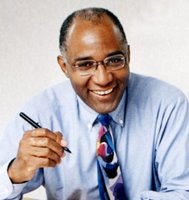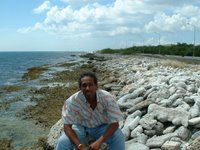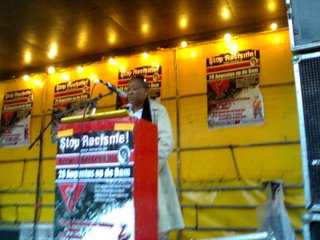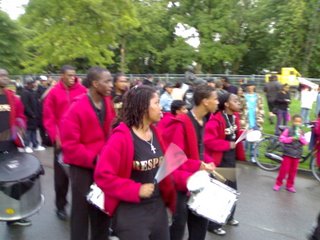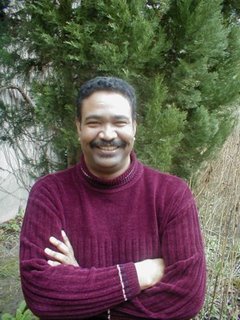 Some of the people I graduated with in 1989 form the Maria Immaculata Lyceum in Curacao. We had a small reunion this month in Utrecht.
Some of the people I graduated with in 1989 form the Maria Immaculata Lyceum in Curacao. We had a small reunion this month in Utrecht.
Marlon is a writer, organiser, journalist and activist, born in Curacao and presently living in Amsterdam. He is a black gay man from the Caribbean in Europe. This blog will be multilangual: Papiamentu, English and Dutch. About culture, politics, art and life!
Thursday, November 30, 2006
Class reunion
 Some of the people I graduated with in 1989 form the Maria Immaculata Lyceum in Curacao. We had a small reunion this month in Utrecht.
Some of the people I graduated with in 1989 form the Maria Immaculata Lyceum in Curacao. We had a small reunion this month in Utrecht.
My radio feature: Habri, ik kom terug Curacao
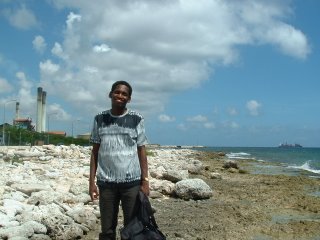
Last September I was in Curacao where I worked on my first radio feature: Habri, ik kom terug Curacao- I’m coming back Curacao. I got an assignment by the Humanistische Omroep to go to Curacao and research how it would be to return home as an openly gay man. I talked to my then boy friend Mario and my mum about our relationship and the island.
Another thing I had to deal with on Curacao was the sudden death of my father when I was six years old. I wanted to know if he would have accepted a gay son. But talking to my uncle the conversation turned in a totally other direction.
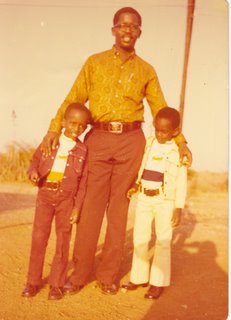 The feature is in the Dutch language.
The feature is in the Dutch language.See for more information about the feature on Radio Atelier.
Click here to listen to my documentary.
Tuesday, October 10, 2006
Debate on integration, race and fiction
'How urban societies disintegrate and become a breeding ground and a battlefield of extremism' .
For this evening Mr. Trevor Phillips, Chairman of the Commission for Equality and Human Rights (CEHR) was invited form the UK to give his view on the matter of ‘integration and migration’ in Europe.
Mr. Phillips gave a very detailed expose on the conflicts raised by the changing societies in most Europe states today. The reason I really admired his views is the fact that he really states what I also believe: the most important thing that should happen in order for all of us to live peacefully together is for the indigenous (Autochtonen in the Netherlands) to accept the fact that their society has changed: we are all here and nobody is going to leave. That mean that your society will have to have laws and institutions that are capable to cater to a diver society. The law will have to be there to impose equality, to create a situation in which no ones ethnic background should dictate it’s chances in live. Our institutions should be able to give all members of society equal chances, in education, health care, housing, political participation etc.
Paul Scheffer, a so called intellectual of the Left was asked to react on Mr. Phillips speech together with the young diplomat Arthur Kibbelaar, member of a advisory group for the Antillean Community.
Mr. Scheffer became famous in the Netherlands when he proclaimed the country was facing a ‘multicultural drama’. In the days of the uprising of rightwing anti- immigration atmosphere, he stated that because a lot of people of the so called ethnic minorities in Holland weren’t doing OK in the education and employment rates was a drama. The integration has failed! In the Fortuyn time the whole establishment agreed with this twisted view on the reality. Figures showed that more people pf ethnic origins were doing better in school and more young black and migrant students were attending higher education. It is true that the unemployment figures among ethnic minorities was still very high. But something like institutionalised racism by employers never came to his mind.
Of course, because he didn’t believe in ‘race’. This he said as a reaction to Mr. Kibbelaar very good contribution to the debate, in which he criticised the way the Dutch society treated citizens on different ways, based on their ethnic background. For example he mentioned the case of the Antillean community, which is constantly under attack of Dutch policy makers because of the criminal behaviour of a group of young Antilleans. The Dutch government wants to take the travelling rights away from young people of the Antilleans with a Dutch passport to prevent them from emigrant to the Netherlands from the islands. Also Mr. Kibbelaar pointed out the racism in the society.
Mr. Scheffer blatantly said he have to put ‘race’ behind us to get ahead. He gave us the scientific history about race as a construction which has been destroyed by the same science which invented it. In a debate about the future of Europe, he calmly said something like that. I was exploding on my chair with indignation. In my last trip to Curacao I was again pointed out as a possible drug trafficker at the air port and was asked questions and hold back for half an hour. I said: ‘they should stop one or two white people, too, just to pretend they’re not racist’ . But when confronted with this accusation, the Dutch minister of Justice just said it was a fact most drug traffickers were black. And Paul Scheffer has the audacity to say ‘race’ doesn’t exists. It is always the same story in which we see that Dutch society just simply denies racism and except us to go along to believe in the fairy tale. We just cannot, because reality knock on our door each day.
I left the debate very satisfied because a lot of people contra- attacked these statements and Mr. Phillips really gave me an impression the UK is really ahead of the ‘always knowing better’ Dutch! I really enjoyed his speech and the way he debated with the opponents. He was also very personal, using his own personal life in his speech.
Ten years ago that could have given me the will to relocate to London. The beautiful big city with much bigger and stronger black communities. I’m 35 now, and I know each story has different sides. The Netherlands also had for me the opportunity to study for example, and Amsterdam enriched me in so many ways. It is time to open our months now here in Amsterdam and Holland.
Tuesday, September 26, 2006
Visit to Curacao
 I just came back from Curacao where I passed two very nice weeks. I rested, partied, visited friends and family and worked on a very exiciting project. I will inform you about that project in the future.
I just came back from Curacao where I passed two very nice weeks. I rested, partied, visited friends and family and worked on a very exiciting project. I will inform you about that project in the future. My mom together with my niece Jaylienne. After she stared at me for three days when I arrived, we became best friend. I'm already missing this nice girl, whom I have know since here birth in Almere. Now she is living in Curacao.
My mom together with my niece Jaylienne. After she stared at me for three days when I arrived, we became best friend. I'm already missing this nice girl, whom I have know since here birth in Almere. Now she is living in Curacao.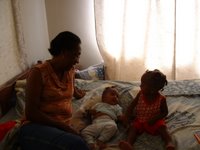
Here my mom with the children, Jaylienne and the youngest one Jurion.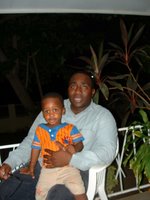 My cousin Robert, who moved back to Curacao last year visited a couple of times with his son Jayven.
My cousin Robert, who moved back to Curacao last year visited a couple of times with his son Jayven.
My dear friend Mario toured me on the island and took me parties during the Get Wet Weekend organised by local gay organisations.
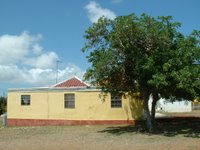 I also visited the house where my father grew up, the central house of the Reina family.
I also visited the house where my father grew up, the central house of the Reina family.
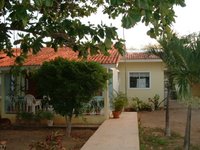 I stayed in the house where I grew up. Now my mother's house.
I stayed in the house where I grew up. Now my mother's house.
Monday, August 21, 2006
The Kerwin Duinmeyer conmemoration
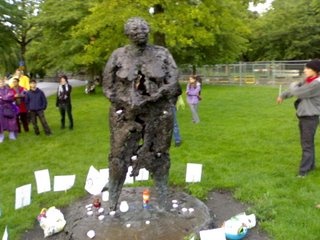
This year the demonstration took part for the 23rd time and people are always guessing about the public attendance. Is the amount of people a sign that people don’t care any more, or is it to much time ago, 23 years.
I visited the event together with friends. Our friend Christa Toppenberg, a very talented and renowned poet from Curacao performed with her own poems and with work of other authors.
The fact that Dijnmeyer was form the Antillean, always inspire the question why there aren’t more people from the islands taking part in the event. I think there are a lot of reasons as to why the participation of Antilleans is low in the Kerwin Duinmeyer- commemoration. At the other hand, a big part of the performers were Antillean, some, like some members of the drumming band Kalentura were very young Antilleans.
Each year when I visit the commemoration I feel a need to get involved. Fact is I have not!
I must find a way to get involved because of a lot of reasons.
I think it’s important to pay attention to the killing of a young, innocent man by a racist lunatic.
I think it’s important to make a big stand against racism in the Netherlands, a country which arrogantly have the idea they’re not racist. The French are, The Germans are, Italians, Spanish, American. The whole world could be racist, but they… not.
I still believe in the power of activism. I believe that another world is possible, if we can convince the people of it!
Listen to a radio-report (Dutch spoken) by the Radio Nederland Wereldomroep.
Saturday, August 19, 2006
Churandy Martina making Curacao proud!
Tuesday, April 18, 2006
by Gary SmithCaribbean Net News Sports Correspondent
EL PASO, USA: Following impressive performances in the outdoor campaign so far this season, Bob Kitchens, head coach at the University Texas at El Paso, believes with a little maturity and technical work Netherlands Antilles' world-rated athlete Churandy Martina can become the best sprinter in the world."Churandy (Martina) is further along at this point than I thought he would be," Kitchens told Caribbean Net News on Monday, "but I do believe he has a lot left that he can do."I believe he has a chance to be one of the best sprinters, if not the best sprinter in the world."At the UTEP Invitational at the Kidd Field in El Paso, Texas on Saturday, Martina improved his personal bests on his way to winning the sprint double with record breaking performances. He clocked 10.04 seconds to claim the 100m and 20.27 for the 200m title, but despite blowing away the field in both races, Kitchens said technically the Islander still has a lot of work to do - noting this will only make him faster."None of the races (this season) have been technically correct and therefore it would lend oneself to believe that he can run faster in both races (100m, 200m)," Kitchens said. "I think he is further along in the 100m and it is probably his best event. He definitely has more than one gear, but again for these things to happen he has to mature as a runner and that will take a little time."Martina has already run 10.17 and repeated 10.04 performances for the 100m in addition to his 20.27, which left many track and field supporters with the belief that he will burn out early and struggle to keep his present form in the future.However, Kitchens told Caribbean Net News that the sprinter's performances are a result of his talent and assured the public that the Antilles star is in good hands."We do have a history of good sprinters in this program," he confirmed. "He (Martina) has as much talent as any sprinter we have had here and that includes (Olapade) Adeniken (of Nigeria) and (Andrew) Tynes (from the Bahamas."We do quite a bit of base work in the fall and I don't believe he will burn out any time soon."He is an exceptional young man that has his head down to earth and is easy to coach."Martina is now the second fastest over the 100m this season behind Jamaican world record holder Asafa Powell's 10.03. After claiming top in the 200m with his 20.27 performance, Martina now trails American Xavier Carter, who leads the world with a 20.13sec run achieved in a head-wind."The atmosphere is very good for training and I am doing my best," Martina said. "I just want to keep improving in both the 100 and 200 every week."In the meantime, at the UTEP Invitational Erma Gene Evans also of the University Texas at El Paso, broke the Saint Lucia national record and improved on her personal best to win the women's Javelin Throw with a mark of 54.19m. Evans' performance ranks her as the second best thrower in the school's history and is fifth in the NCAA in this year.
Friday, August 11, 2006
My ol' bud Bongane wins gold medal!
 In this edition of "Keeping It Real" Joe Hawkins interviews two-time Gold medalist Bongane Nyathi, who won a Gold and a Bronze medal in the 2006 Gay Games in Chicago. Bongane also discusses his inspirational journey from South Africa to America and the motivation behind his winning attitude.
In this edition of "Keeping It Real" Joe Hawkins interviews two-time Gold medalist Bongane Nyathi, who won a Gold and a Bronze medal in the 2006 Gay Games in Chicago. Bongane also discusses his inspirational journey from South Africa to America and the motivation behind his winning attitude.See the interview, thanks to 'Keeping it Real'
Marlon Reina
Sunday, July 30, 2006
Go for your dreams!
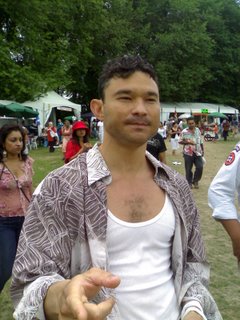
Today a the Kwakoefestival, (annual Afro Surinam festival with sports, food and music) I met Manolito, a guy I’ve known since kindergarten in Curacao. I haven’t seen him for more then ten years and after talking about our lives he asked me what I was doing.
When I told him I was working at a theatre, he was very surprised. He told me he remembered me as a very young guy drawing theatre curtains, theatre lightning, microphones and singers and dancers performing. He said ´You are realising your dreams´.
It was very touching to hear him say that, because I never realised that. I ´forgot´ about those dreams as a young boy. But I truly believe that at the end, what really make us happy is realising our dreams. And I think that as a young child, you can dream more freely, so to everyone go back to the dreams you had as a little child and realise them. You didn’t have those dreams just to have them. Dreaming is the way you can see everything you can become and realise in the future.
Thank you very much Mano and please do the same!
Tuesday, July 11, 2006
Modern dance from Africa
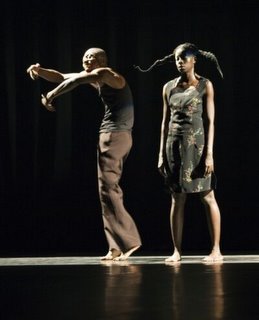
The second piece we saw was called by the choreographer Andréya Ouamba from Senegal. She danced in it too. On stage there were a couple, seemingly living on the street in cartons. The dance was a kind of a battle between the man and the woman, with expressions of fear, loneliness, attraction and reclaiming own identities. The way they moved was very staccato, with short movements with strange bowing of arms and legs. I liked it very much. This was for me the best dance of the evening.
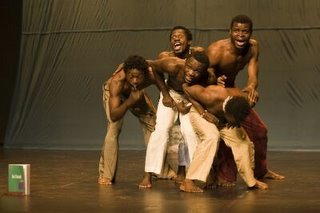
I also liked the group Mona- Mabu (Li Sangha company) from Congo a lot. They danced a choreography by Orchy Nzaba about daily life in the community, with a lot of familiar things like drinking beer together, playing and having small discussions. All of this danced in a nice rhythmical choreography by a group of five dancers. The group was completed with a storyteller who narrated and performed with the group.
It was nice to see professional dancers from Africa doing their modern dance, with a very own style. It was modern dance, but it wasn’t a copy of what you will see in Europe. And it was African, but it was not the traditional African dance we all know so good, and like a lot too. It was something new and beautiful, modern and African.
Wednesday, June 28, 2006
Sunday, June 18, 2006
Bob Harms: praise for Oduber's public admiration for President Chavez his social policy
Today I post a column by the journalist and columnwriter Bob Harms about the way the Venezuelan president Hugo Chavez is potrayed in the media. He praises the Aruban prime minister Nelson Oduber for not letting the lies told in the media keep him for expressing his admiration for Chavez' social politics.
Bob Harms in La Prensa
Un pal’i hòmber!
No ta tur biaha mi por uni mes ku pensamentunan di promé minister di Aruba, Nelson Oduber. Pero un kos ta sigur. E ta manera ta bisa den bon papiamentu, un pal’i hòmber!
Miéntras ku na Kòrsou tur hende ta bira “diplomátiko” ora nan ta papia di presidente di Venezuela, Hugo Chavez i su gobièrnu, promé minister Oduber si ta sali i para manera un hòmber pa loke e ta pensa. E loke e presidente demokrátikamente eligí di Venezuela ta hasiendo pa e klase marginá di su pais, ta kos di apresiá, punto! Inkreibel ku na aña 2006 ainda tin hende spantá pa e zumbi di komunismo. Ainda tin hende ta kana rònt den e reino ku nos ta biba aki ku pensamentu di temp’i kouchiboulo ku si un hende ekspresá palabranan di apresio pa un persona òf movementu di tendensia sosialista, e persona aki ta un komunista òf anti Merka.
Loke ètól no ta yuda ta prensa internashonal dominá pa interesnan komersial merikano. Esun ku ta limitá su mes na sigui notisia for di fuentenan manera CNN, FOX News, Venevision, etcetera lamentablemente ta haña informashon parsial i distorsioná di loke realmente ta pasa na Venezuela. Un ehèmpel klásiko ta e supuesto persekushon di periodistanan na Venezuela. Direpente prensa internashonal ta yen di informe tokante supuesto persekushon di periodistanan na e pais bisiña. Sin ku niun hende por produsí un gota di prueba verídiko, tòg ta reina e impreshon ku na Venezuela no tin libertat di prensa.
Wèl, nada ta mas leu di bèrdat. For di dia ku Chávez a sinta kasi 8 aña pasá, nunka ainda a arestá un periodista venezolano pasobra ela skibi kontra Chávez. Ta bon pa menshoná, ku grupo Cisneros, doño di medionan di komunikashon gigantesko manera entre otro Venevision i DirectTV, ta operando ketu bai for di Venezuela, sin ningun estorbo di parti di gobièrnu venezolano. Anto tur hende sa ku Venevision ta enemigu deklará di Hugo Chávez, su gobièrnu i movementu polítiko.
Loke tur hende aparentemente a lubidá tabata kon eks presidente Carlos Andres Perez si tabata pèrsigui periodistanan na Venezuela. No laga nos lubidá 1992, tempu di e gòlpi di estado frakasá ku Chávez mes a enkabesá. Desena di periodista a bai sera i hasta torturá e tempu ei pa funshonarionan di polis sekreto DISIP, bou di mando di e ‘famoso’ comandante Henry Lopez Sisqo riba órden di Carlos Andres Perez. Si, e mesun Lopez Sisqo ku a fusilá e dos sekuestradornan di e avion di Aeropostal den e mardugá dramátiko di djamars 1 di òktober 1984 na Hato. Por sierto ku Carlos Andres Perez ta e úniko dirigente polítiko, “demokrátikamente eligí” ku Sosiedat Interamerikano di Prensa (SIP) a kondena pa e manera kon e la pèrsigui periodistanan na Venezuela.
No shonnan. Si Chávez ta usa rekursonan ku suela di su pais ta produsí pa aliviá e situashon di esnan ku mas tin mester, ta kos di elogiá. Ta p’esei Dios ta bendishoná un pueblo ku rikesanan natural. No pa e grupito ku pa siglo i siglonan a prosperá ku sanger, sodo i lágrima di esnan pober. I si Nel Oduber tin e kurashi pa bisa esaki sin miedu, e ta un pal’i hòmber!
Te otro siman ku poder di Dios (Bo opinion, opservashon òf krítika ta bonbiní: bobharms@setarnet.aw )
Thursday, May 18, 2006
Gainan Fini: Transvestism on stage

Starting May 27, Gainan Fini will be playing at Teatro Luna Blou in Curacao. Gainan Fini is a Caribbean La Cage aux Folles. I know a lot of so called 'straight acting' gay man on the island will feel the need to keep on stating that they're not like that. That they're not 'women 'and will complain about the fact that only effeminate gay men get public space in the Curacao popular culture. It is true, that in popular culture there is 'space' for men to be homosexual if they act (and sometimes dress) in a feminine way. But it's also true that most 'normal' gay men wouldn't dare to go public with their sexuality. It's always the same discussion. It also happened in New York during the so called Stonewall Riots. The men that could pass for straight did that and blended in the crowd, and the transvestites stood there and fought with the police.
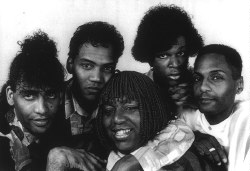 The same five courageous guys from Antillean descent did when they told their own story in the documentary Marival, by Felix the Rooy. At a viewing of the documentary in Rotterdam, again someone in the audience made the remark about this portrayal of gay men. The filmmaker De Rooy was present and remarked correctly that those guys were ready to tell their story in front of the camera, something most other wouldn’t.
The same five courageous guys from Antillean descent did when they told their own story in the documentary Marival, by Felix the Rooy. At a viewing of the documentary in Rotterdam, again someone in the audience made the remark about this portrayal of gay men. The filmmaker De Rooy was present and remarked correctly that those guys were ready to tell their story in front of the camera, something most other wouldn’t.
Gainan Fini will be entertainment making fun of transvestites, but also a stage for some transvestites on the island to express themselves. I would go if I was on the island.
I must confess that another reason to publish about this play is the fact that my friend Vincent designed the poster, which I found very good!
Gainan Fini:
Gainan fini di Eligio Melfor ta e vershon di 'cage aux Folles' di Kòrsou. Den e komedia sumamente humorístiko aki, e mayornan di e pareha ku ta bai kasa, mester bin huntu pa sera konosí. Komo tata di e brùit ta un funshonario públiko di gobièrnu di masha haltu kategoria i kontakto, nan no por pèrmití, pa e haña sa ku e yònkuman ku ta bai kasa ku su yu muhé, su mayornan ta un pareha hòmber homoseksual. Pa e motibu aki un di nan dos mester bisti na muhé pa hunga ròl di mama. Aki tur e situashon di hilaridat ta kuminsá. Un komedia ku bo no por pèrdè.
Monday, May 08, 2006
Controversial gay soap opera grips Cuba
A TV soap opera is generating controversy on the streets of Cuba and attracting a record number of viewers. The reason? It is about what until now has been a taboo for Cuban TV: homosexuality.
Rafael Lahera faced discrimination after acting in the soapIt seems to be the sole topic of conversation in the workplace and the neighbourhoods, even though many men insist angrily that they do not watch "that telenovela in which a married man 'discovers himself' through a sexual relationship with a male friend".
It is the first time that television in Cuba has dared to broach the subject. It never even screened Strawberries and Chocolate, a classic Cuban film about the marginalisation of gay people.
The soap - The Dark Side of the Moon - shows the problems a bisexual man faces in today's Cuba, including his friends' revulsion and rejection by his parents.
Yaser, the bisexual character, says: "Everything I sacrificed myself for, I have lost."
His friend and partner tells him he understands.
It is good for the people to be informed, so that youngsters are not tricked or trapped into that kind of thing, that homosexual thing
Raimara Casas
"I also lost the affection of my parents and siblings," he says.
It is dialogue like this that is creating a stir across the island. The two men are not shown having any physical contact "so as to avoid offending viewers".
However, some do feel offended, including members of a group of retired men who I spoke to in a Havana park.
"I don't watch it. My wife does, but I don't like it because of the rude things they say," one says.
Another says: "I cannot get used to it, because what we were taught when we were young was morally different."
Discrimination
A different view on the soap opera comes from Raimara Casas, who thinks it serves as a warning.
Some Havana residents say they find the soap opera offensive
"It is good for the people to be informed, so that youngsters are not tricked or trapped into that kind of thing, that homosexual thing," she says.
There are also people like Maria Nora, who think The Dark Side of the Moon is important because "it shows an openness on this issue that is not even found in foreign soap operas".
Actor Rafael Lahera, who plays Yaser, says that to broach "such a delicate subject in such a macho society" is an important step for Cuban TV.
But playing the leading role has not been without problems.
"People think I'm gay," he says. And, he adds, he has been turned down for acting jobs because employers do not want a role to be played by a homosexual.
Such discrimination is not unusual in Cuba, where in the 1960s and 70s homosexuals were sent to labour farms.
Today, gays and lesbians are socially isolated, the police harass transvestites and the government is refusing to authorise sex changes for transsexuals.
Maybe this soap opera will contribute towards changing that.
Wednesday, April 12, 2006
Role Models
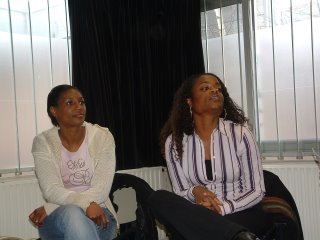
The Antillean community in the Netherlands is largely portrayed as criminals, rapists and irresponsible parents. It must not be easy to grow up as an Antillean in Dutch cities those days. A lot of people are putting their time available to give the youth good examples and teach them a lot for their own development. So is the project Luna Ku Solo, a musical program in the Bijlmer, where different Antillean music teachers give lessons to young children that wouldn’t normally go a music school. Praise to Mr.Eugene Boereveen, the initiator of this project. Today, April 12, the young musicians were visited by two big singers of Antillean descent, Edsilia Rombley, who represented Holland in the Eurovision song festival and the jazz diva Izaline Calister. It was very good to see the youngsters talking to their own role models.
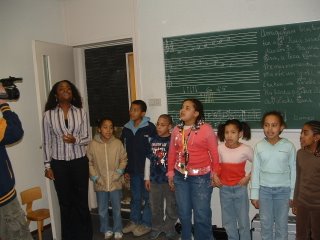 The singing group singing traditional children songs from Curacao together with Izaline Calister, who told them she began singing at the age of seven in the children group Perlitas in Curacao.
The singing group singing traditional children songs from Curacao together with Izaline Calister, who told them she began singing at the age of seven in the children group Perlitas in Curacao.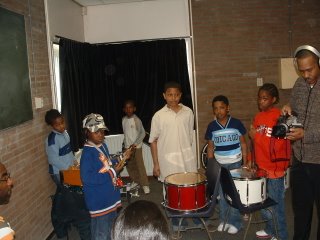
Monday, April 10, 2006
Saint Gregorio Hernández
 Jose Gregorio Hernández ( 1864- 1919) was a priest from Venezuela who was very famous for his medical achievements and religiosity. He wasn’t declared saint by the Catholic Church, but a lot of people pray to him for health. So did my mother when I was born very weak, and she named me after him, Marlon Gregory. Funny thing is, that when I was lonely and put messages on so called sex lines, I used my second name: Gregory. That is what this poem is about.
Jose Gregorio Hernández ( 1864- 1919) was a priest from Venezuela who was very famous for his medical achievements and religiosity. He wasn’t declared saint by the Catholic Church, but a lot of people pray to him for health. So did my mother when I was born very weak, and she named me after him, Marlon Gregory. Funny thing is, that when I was lonely and put messages on so called sex lines, I used my second name: Gregory. That is what this poem is about.San Gregorio Hernández
San Gregorio Hernández
Abo ku ta kura enfermonan
San Gregorio Hernández
Na abo nos ta roga
San Gregorio Hernández
Dòkter pa riku i pober
San Gregorio Hernández
San Gregorio Hernández
Mi por puntra bo un kos?
San Gregorio Hernández
Mi tin sanger den mi kurpa
San Gregorio Hernández
Mi ke sinti..
San Gregorio Hernández
Brasa brutu rondó di mi.

English translation
Saint Gregorio Hernández
Thou, a man with a cure for our illness
Saint Gregorio Hernández
I address this prayer to you
Saint Gregorio Hernández
Thou, healer of the poor
Saint Gregorio Hernández
Saint Gregorio Hernández
Can I ask you a question?
Saint Gregorio Hernández
Blood is going through my veins
Saint Gregorio Hernández
I wanna feel...
Saint Gregorio Hernández
The embrace of strong arms.
Sunday, April 02, 2006
Spike Lee's new film

The director talks about making his biggest-budget film ever; his long working relationship with Denzel Washington; and his next project: a documentary on the response to Katrina.
Listen at National Plubic Radio.
Wednesday, March 29, 2006
Semana Gay Latino
The program is organised by Rebeldía Rosa, from the youth-organisation Ojalá from 3 arpil till 9 april. For this program 4 young queer activists from Latin Ameria have been invited to the Netherlands. All are figthing in their countrys for gay, lesbian, bisexual and transgedner rights. In the Semana Gay Latino there will be films, debates and a party.

Ojalá presenta: een week van activiteiten over jongeren en homosexualiteit in Latijns-Amerika. In de week van 3-9 april organiseert de groep Rebeldía Rosa van jongerenorganisatie Ojalá een week van activiteiten met het thema: Jongeren en homosexualiteit in Latijns-Amerika: GayLatino. We hebben hiervoor 4 jonge queer activisten uit Latijns Amerika uitgenodigd voor een bezoek aan Nederland. Allen zijn in hun land actief bij jongeren-organisaties die strijden voor de emancipatie van lesbo's, gay's, bi's en transsexuelen (LGBT's).
The program:
• Tuesday April 4/ Dinsdagavond 4 april 20:00-23:00: Discussionmeeting at the Political Cafe/politiek café De Klinker at De Grote Broek in Nijmegen. Adress: Van Broeckhuysenstraat 46, Nijmegen. Entrance: free.
• Wednessday April 5/ Woensdagavond 5 april 20.00-23.00 april: Discussionmeeting at Het Broeinest in the Plantage Dok Amsterdam. Adress: Plantage Doklaan 8-12, Amsterdam. Entrance: free.
• Thursday April 6/ Donderdagavond 6 april 20.30-23.00: Discussionmeeting in cooperation with Outsite at the space of Delftse Werkgroep Homoseksualiteit Adress: Lange Geer 22, Delft. Entrance: free.
• Friday April 7/ Vrijdagavond 7 april 22:00-04:00: Rebels Latin Queer Party with DJ Tía, Alternatieve Latino sounds (oa, salsa, regguetón, pachanga) among others. This is a benefitparty: so give extra money and drink a lot to support the Latin American LGBT- struggle. Location Club COC at Rozenstraat 14 in Amsterdam. Entrance : 5 euro.
• Sunday April 9/ Zondagmiddag 9 april 16:00-20.00:00: Salon Cine GayLatino with GayLatin films and a photo exhibition about crossdressing in La Paz Bolivia. After the movies there is space for conversation with the Latino activists. Location: Latijns-Amerika Centrum, Nieuwe Herengracht 29, Amsterdam. Entrance: free.
Macros Cipriano da Silva is 21 jaar en woont in Brasilia, hoofdstad van Brazilië. Brazilië is het land waar de meeste homofobe moorden per jaar plaats vinden (3 moorden per week). Marcos werkt hij aan een jongerenproject Cre Ser van organizatie Estruturação. Estruturação is vooral gespecialiseerd in het geven van rechtenonderwijs en het oprganiseren van de jaarlijkse Gay Pride.
Maria Zamora is 23 jaar oud en woont in Managua, hoofdstad van Nicaragua. Nicaragua is het enige land in Latijns-Amerika waar homoseksualiteit nog officieel bij wet verboden is. Maria werkt voor organizatie Grupo Safo. Grupo Safo richten zich voornamelijk op de emancipatie van jonge lesbische vrouwen en de strijd om het verbod op homoseksualiteit uit de grondwet te halen.
Jorge is 26 jaar en komt uit Lima, hoofdstad van Peru. Hij is werkzaam voor de organizatie Raiz para la Diversidad Sexual. Deze organizatie probeert studenten te motiveren zich op politiek vlak in te zetten voor de homo-strijd. De homostrijd is vooral een onderdeel van een bredere politieke strijd voor een betere wereld volgens Raiz. Ze proberen daarom aansluiting te vinden met Peruaanse vakbonden en politieke partijen.
Pedro is 29 jaar en komt uit La Paz, Bolivia. Hij is daar lid van de organizatie La Familia Galan. La Familia Galan is een groep transformistas oftewel transgenders en travestieten. Zij proberen door hun aanwezigheid in het openbare leven de samenleving de tolerantie ten opzichte van travo's te vergroten. Mocht je ooit in La Paz in een van de vele demonstraties een travo op stelten tegen komen dan weet je: es La Familia Galan.
Deze jonge LGBT activisten zullen samen met Ojalá proberen de problematiek van LGBT jongeren in Latijns Amerika onder de aandacht te brengen. Daarom woren in de GayLatino-week een aantal info-avonden georganiseerd met als afsluiting een Super-Cool-Queer-Latino-Party op vrijdag 7 april. Ieder info-avond zullen de activisten vertellen over hun werk en in discussie gaan met Nederlandse homo-activisten. Natuurlijk is er uitgebreid de ruimte hen vragen te stellen. Ook is er iedere avond een Latino-Gay film en een foto expo over travestie in La Paz. Kortom: een unieke kans op een ontmoeting met de Latijns-Amerikaanse queer-actie scene! Viva la primavera con la Rebeldia Rosa!
My first staged play
I've written different pieces for magazines, the radio, and a lot of poetry. But last weekend my first piece of theatre was satged by a group of young people in Amsterdam, directed by Raymi Sambo. The story was an idea of Raymi Sambo. I thank him a lot for his trust.

Thursday, March 02, 2006
Karnaval 2006
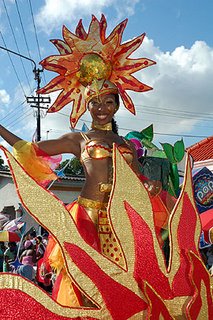
Curacao

Trinidad & Tobago

Curacao
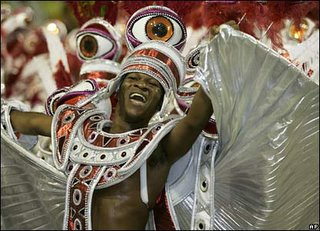
Rio de Janeiro

Aruba

Curacao
Saturday, January 21, 2006
What kind of a rebel are you?

Later we got an envelop with a description of the kind of rebel we were. I will translate for you what mine said, and gave my comments on it in yellow.
Power
To survive
I suppose I have this kind of power, I have never thought seriously about suicide for example. But I don’t see my self as a model of Power, which I connect more with physical strength.
Powerful rebel,
Freedom, equality and brotherhood (Liberté, Equalité et Fraternité) are very important to you.
That is true, these were also one of the inspirations for the Big Slave Rebellion of 1795 in Curacao which I’ve been commemorating in Amsterdam. 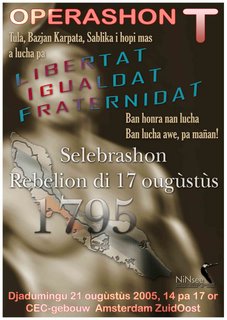
You are a born leader, but can also be a good follower. For you there is no mountain too high, you will do your utmost to achieve your goals.
This is more the person I’m becoming today. In the past I wasn’t always good in touch with my dreams and goals, so I didn’t always try hard to achieve them.
Your body is your temple and for that reason you take very good care of you. Exercise, drinking a lot of water, each day evolves around yourself. Because the best men wins!
Wish this was true. Today I got home after working at 10.30 PM and had to cook my dinner at that time. I was tired, cold and miserable. I really have to learn yet to take good care of myself.
Some people sees this as a bad thing. But that is because they don’t realise you also need power and knowledge to be able to take care of others. Keeping the harmony can be trusted to you. Just Do It.
I think I’ve been doing this one.
Your role model: Oprah Winfrey
I have a hatred-love thing with Oprah. Sometime she really annoy me with her to obvious commercial praise for artist: ‘Oh, you are the best actor I know…’. But in other shows she reacts on people in the most mature way possible, and guide them to see their own realities in such a honest and profound way. No, Oprah is Top.
Your Link: nl.wikipedia.org
This is new to me .
Your action: adopt a chicken.
No, no no! In those senses I will always be a Curacao man. Animals are important, but don’t exaggerate.
I have to say Big Up to Hidde Simons who organised this part and sent me the picture I asked him.
Saturday, January 14, 2006
Tania Kross sings Curacao

Curacao born mezzo-soprano Tania Kross will perform a special program with songs of her native island Tuesday 17 January at the Muziekgebouw aan het IJ in Amsterdam.
Mezzosopraan Tania Kross is bijna altijd alleen maar te horen in allerlei operatheaters met de prachtigste aria’s. Maar er is nog een andere kant : haar Antilliaanse roots.
Juist omdat haar carriere zo voorspoedig verloopt, heeft het splinternieuwe en schitterende Muziekgebouw aan het IJ in Amsterdam Tania de kans gegeven om een programma samen te stellen met repertoire dat haar na aan het hart ligt, en dat hier in Nederland bijna nooit te horen is : muziek uit haar ‘eerste thuisland’: de Caraïben.
Ze heeft een pracht programma samengesteld met o.a. Bo tin ku bolbe (van René Clemencia), Soño di anochi en Nenita (van Emilio Prudencia), Chuchubi en Sunú (van Oswin “Chin Behilia), en natuurlijk Tantan Meri en Nonze su kantika di tambu, waarin allerlei mooie muzikale kanten van de Antillen belicht worden.
Tania zou niets liever willen dan al deze liederen te zingen voor mensen, die dezelfde warme gevoelens bij deze muziek krijgen als zij zelf. Voor mensen die weten waar de muziek over gaat. De warmte van de Antillen wordt dan ook voelbaar in de zaal, zodat iedereen ongetwijfeld blij naar huis gaat. Juist omdat deze muziek bijna nooit in een dergelijk mooie setting wordt uitgevoerd, zou Tania het geweldig vinden juist dit concert met u te delen.
Randal Corsen en Roel Calister en nog veel meer musici spelen mee. Tania kreeg hiervoor carte blanche van het Muziekgebouw.
Dit eenmalige concert vindt plaats op dinsdag 17 januari a.s. om 20.30 uur in Muziekgebouw aan het IJ in Amsterdam. Er zijn vast nog wel last minute kaartjes te krijgen, maar om goede plaatsen te krijgen is het verstandig van te voren de kassa te bellen op tel. 020-788 2000, en te reserveren.
Muziekgebouw aan het IJ ligt vlak achter het Centraal Station, en is uitstekend per auto te bereiken. Vlakbij is een ruime parkeergarage.
Wednesday, January 04, 2006
The best of 2005
The worst of 2005

Two young men were killed in Iranbeacuse they were gay Authoroties declared they were punished for a rape case, a excuse oftenly used in cases where sons of rich and influential people get caught in homosexual acts. Read more at the site of the International Gay and Lesbians Human Rights Commission.
